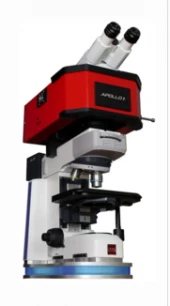Description
The Apollo M™ Raman Microspectrometer is a state-of-the-art instrument designed to cater to both cutting-edge research and routine applications with unparalleled reliability and ease of use. This advanced system allows for the swift acquisition of Raman microspectra™, enabling researchers to concentrate on their sample measurements rather than the intricacies of the instrument's operation. Its versatility makes it an ideal choice for advanced research, routine analysis, quality control, and failure analysis across various scientific disciplines.
At the heart of the Apollo M™ is a combination of optimized optics, software, and hardware, all tailored for Raman spectroscopy of microscopic samples. The inclusion of a fixed confocal aperture ensures robust and reliable measurements, making it perfect for rapid, non-destructive analysis in fields such as life sciences, materials science, chemistry, and physics. The system's modular and flexible design allows for seamless integration with an upright microscope, facilitating confocal Raman microspectroscopy with ease.
The Apollo M™ Raman Spectrometer offers a range of configurations to suit different research needs, including solid-state spectrometers for speed and sensitivity, as well as scanning spectrometers for more advanced research applications. Additional capabilities such as kinetic Raman and photoluminescence microspectroscopy, along with high spatial resolution imaging and mapping of Raman spectra, provide researchers with the ultimate in experimental flexibility. Furthermore, the Apollo M™ can be combined with other CRAIC microspectrometers, expanding its capabilities to include UV-visible-NIR microspectroscopy, film thickness measurements, and more.
Designed for both standalone use and integration with CRAIC's UV-VIS-NIR Microspectrophotometer, the Apollo M™ Raman Microspectrometer is a robust, reliable, and powerful tool that enhances research capabilities. Whether you're conducting high-performance Raman microspectroscopy or integrating additional functionalities, the Apollo M™ is engineered to meet the demands of modern scientific research.
Apollo M Raman Microspectrometer
Specifications
| Excitation Wavelength: | Around 532 nm, Narrowband VIS, Around 638 nm |
|---|---|
| Multi-Wavelength Capability: | No |
| Spectral Range: | 150 – 2000 cm^-1 |
| Detector: | CCD |
Features
- High Performance Raman Microspectroscopy: The Apollo M™ is designed for cutting-edge research, offering robust, reliable, and powerful performance.
- Ease of Use: Fast and easy acquisition of Raman microspectra™ allows users to focus on sample measurements rather than instrument operation.
- Modular and Flexible Design: Easily installable on an upright microscope for confocal Raman microspectroscopy, providing experimental flexibility.
- Advanced Research Capabilities: Offers solid-state spectrometers for speed and sensitivity, and scanning spectrometers for advanced research.
- Comprehensive Analysis: Supports kinetic Raman and photoluminescence microspectroscopy, imaging, and mapping of Raman spectra with high spatial resolution.
- Integration with CRAIC Microspectrometers: Combine with other CRAIC systems for UV-visible-NIR microspectroscopy, film thickness measurements, and more.
- Standard Laser Wavelengths: Available wavelengths include 405, 532, 633, and 785 nm for versatile applications.
- Manual or Automated Operation: Offers both manual and fully automated operation to suit different user needs.
- Precision Temperature Control: Features precision temperature control of samples for accurate measurements.
- Specialized Software: Includes software for statistical analysis, spectral databases, image analysis, and more.
Applications
- Biology & Life Sciences: Non-destructive chemical and structural analysis of biomaterials.
- Materials Science & Nanotechnology: Characterization of graphene, carbon nanotubes, and nanomaterials.
- Semiconductors & Electronics: Failure analysis, contamination detection, and process monitoring.
- Chemistry & Catalysts: Molecular identification and reaction monitoring with high sensitivity.
- Pharmaceutical Quality Control: Verification of drug composition, contamination analysis, and counterfeit detection.
- Geology & Energy: Study of minerals, fuels, and advanced energy materials.
Frequently Asked Questions
What is the Apollo M Raman microspectrometer designed for?
What are the applications of the Apollo M Raman microspectrometer?
What are the features of the Apollo M Raman microspectrometer?
Can the Apollo M Raman microspectrometer be combined with other CRAIC microspectrometers?
What types of spectrometers are offered with the Apollo M Raman microspectrometer?
Your inquiry has been received.
Create an account by adding a password
Why create an account?
- Auto-complete inquiry forms
- View and manage all your past messages
- Save products to your favorites
- Close your account anytime — no hassle
